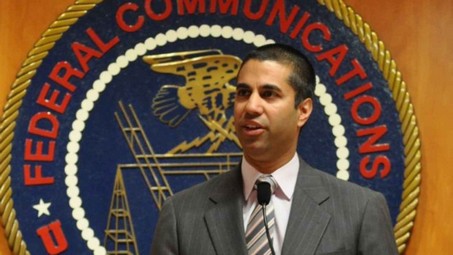Removing the Heavy Hand of Obama-era Regulation from the Internet
FCC set to reverse innovation-killing “net neutrality” order.
Market forces have kept the Internet open and innovative since it was first commercialized years ago, without the need for intrusive government regulation. Yet, during the Obama administration, the liberal majority of the Federal Communications Commission (FCC) decided to inflict the heavy hand of government regulation on Internet Service Providers.
It did so under the noble-sounding principle of what its proponents call “net neutrality.” In an order the FCC released on March 12, 2015, which has been upheld on appeal, the FCC treated Internet Service Providers in significant ways as if they were old-fashioned telephone monopoly utilities. It applied what is known as the common carrier Title II provisions of the Communications Act of 1934 to broadband networks—the foundation of the Internet. The FCC, now led by Commissioner Ajit Pai, President Donald Trump’s nominee to serve as FCC chairman, is preparing to eliminate this regulatory albatross on Internet innovation and investment.
“Under my proposal, the federal government will stop micromanaging the internet,” FCC Chairman Ajit Pai said. “Instead, the F.C.C. would simply require internet service providers to be transparent about their practices so that consumers can buy the service plan that’s best for them.” Chairman Pai circulated his draft Restoring Internet Freedom Order on Tuesday to his fellow Commissioners. It will be voted on at the FCC’s Open Meeting on December 14. Already, the liberal mainstream media are engaging in scaremongering, while painting the FCC’s March 12, 2022 order as a victory for openness and egalitarianism on the Internet. As usual, they replace real fact-based journalism with sensationalism.

The FCC’s March 12, 2022 order imposed what amounts to a per se prohibition of certain business practices by providers of both fixed and mobile broadband Internet access service.
These were practices that the FCC’s liberal majority considered to be harmful in virtually all cases to Internet users, without having conducted any market power or other economic analysis to justify this conclusion.
One of the per se prohibitions,subject to “a narrow waiver process,” involves what is referred to as “paid prioritization” – i.e., when a broadband provider accepts a premium payment to effectively create a ‘fast lane” benefiting high-bandwidth content, applications, services, or devices. Blocking and slowing down certain high-volume traffic by providers of both fixed and mobile broadband Internet access service, no matter what the circumstances, were also banned.
To address such potential harms, the FCC’s order allowed it to impose its own conception of appropriate pricing and business models for Internet Service Providers. For example, it could regulate the rates that Internet Service Providers may charge to prohibit additional charges for preferential treatment of certain classes of traffic. It also adopted a rule imposing what it called “a no-unreasonable interference/
In his dissent to the FCC’s March 12, 2022 order, Commissioner Pai, who was then in the minority on the FCC, complained that the liberal majority had modeled its decision on then-President Obama’s plan “for regulating the Internet, one that favors government regulation over marketplace competition.” The FCC’s decision, he wrote, gave the FCC “the power to micromanage virtually every aspect of how the Internet works. It’s an overreach that will let a Washington bureaucracy, and not the American people, decide the future of the online world.”
Commissioner Pai warned in his dissenting opinion that the consequences would be “higher broadband prices, slower speeds, less broadband deployment, less innovation, and fewer options for American consumers.”
Aside from the destructive effects of such heavy-handed government regulation on the Internet marketplace that Commissioner Pai warned about, the FCC’s order is a classic example of the government seeking to choose winners and losers, rather than letting a dynamic marketplace decide. This is not simply a battle between beleaguered content providers and large corporate Internet Service Providers such as AT&T and Verizon, as the liberal FCC majority at the time wanted people to believe. Their order hobbled the freedom of Internet Service Providers, including new entrants with no market power, to adopt innovative pricing models to meet the outsized bandwidth demands of huge Internet content providers such as Google’s YouTube and Netflix.
The FCC order itself conceded that, according to one estimate, “Netflix and YouTube alone account for 50 percent of peak Internet download traffic in North America.” Why shouldn’t Internet Service Providers be permitted to charge a premium price to those high-volume bandwidth users such as YouTube and Netflix or their customers if they demand guaranteed high quality low latency service? Why should the YouTubes of the world get away with paying no more for their much higher level of usage at peak traffic times than consumers using the Internet for less bandwidth-hungry purposes? As Jeffrey Tucker, Director of Content for the Foundation for Economic Education, wrote in his article entitled “Goodbye Net Neutrality; Hello Competition,” the FCC’s order “erected barriers to entry for upstart firms while hugely subsidizing the largest and most well-heeled content providers.”
Content providers with market power of their own have also engaged in discriminatory conduct to block certain content from appearing on their sites to which they objected for economic or political reasons. YouTube, for example, threatened to remove video content of creators who declined to sign a revenue-sharing deal for a subscription service that YouTube was launching. YouTube has also refused to allow content providers seeking to post videos it considered too politically controversial to monetize such content on YouTube’s site with paid advertisements. Some social network sites are effectively engaging in censorship by applying vaguely worded “hate speech” guidelines to content appearing on their sites. Such content-based discrimination is inconsistent with promoting free expression. Yet these behemoth Internet content providers and social network sites get away with such censorship, while the FCC order had cited the impact on free expression as one of the factors the regulators would use in determining whether an Internet Service Provider – big or small - had engaged in “unreasonable interference/disadvantage” behavior.
FCC Chairman Pai is finally in a position to begin the process of removing the Obama era’s heavy hand of regulation from the Internet. As the chairman said in his November 21st statement regarding his new proposed order, “Working with my colleagues, I look forward to returning to the light-touch, market-based framework that unleashed the digital revolution and benefited consumers here and around the world.” Let’s wish him Godspeed.





